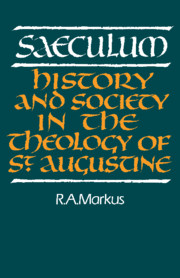Book contents
- Frontmatter
- Contents
- Introduction to the revised edition
- Preface
- Abbreviations
- 1 History: sacred and secular
- 2 Tempora Christiana: Augustine's historical experience
- 3 Civitas terrena: the secularisation of Roman history
- 4 Ordinata est res publica: the foundations of political authority
- 5 Afer scribens Afris: the Church in Augustine and the African tradition
- 6 Coge intrare: the Church and political power
- 7 Civitas peregrina: signposts
- Appendixes
- Bibliographical note
- List of works referred to
- Index
7 - Civitas peregrina: signposts
Published online by Cambridge University Press: 26 October 2009
- Frontmatter
- Contents
- Introduction to the revised edition
- Preface
- Abbreviations
- 1 History: sacred and secular
- 2 Tempora Christiana: Augustine's historical experience
- 3 Civitas terrena: the secularisation of Roman history
- 4 Ordinata est res publica: the foundations of political authority
- 5 Afer scribens Afris: the Church in Augustine and the African tradition
- 6 Coge intrare: the Church and political power
- 7 Civitas peregrina: signposts
- Appendixes
- Bibliographical note
- List of works referred to
- Index
Summary
We have come to the end of our investigation of a complex strand of Augustine's reflection, that concerned with divine purpose in human history, with the function of politically organised society, and with the place of the Christian Church within it. Following Augustine's lead, we have adopted the term saeculum to refer to the realm to which this reflection refers. Our investigation has shown that as Augustine's thought in this sphere took shape, it lent itself less and less to interpretation in terms of a ‘theology of the Constantinian (or Theodosian) establishment’. It is, of course, plain that as a provincial bishop Augustine was nevertheless very much an ‘establishment’ figure. The conditions of the organised life of his Church and of bearing episcopal office in it would scarcely have allowed anything else. Even though, in the years following 410–11, Augustine lost his earlier enthusiasm about the alliance between the Roman Empire and the Catholic Church, he could hardly have renounced it in practice. Indeed, he went so far as to invoke this alliance repeatedly, especially where coercing schismatics or heretics was concerned. In terms of his theology of coercion, conceived as an activity of the Church and as an exercise of pastoral care, Augustine could take such an attitude without dishonesty. His practice accorded well with principles which had deep roots in his mind. In the last chapter we have tried to disengage these principles from a tangled context, and to indicate how Augustine could reconcile them with the dominant emphasis of his theology of the saeculum. We concluded that he could do so quite simply because for him coercion was an act of the Church, not of the state.
- Type
- Chapter
- Information
- SaeculumHistory and Society in the Theology of St Augustine, pp. 154 - 186Publisher: Cambridge University PressPrint publication year: 1989



